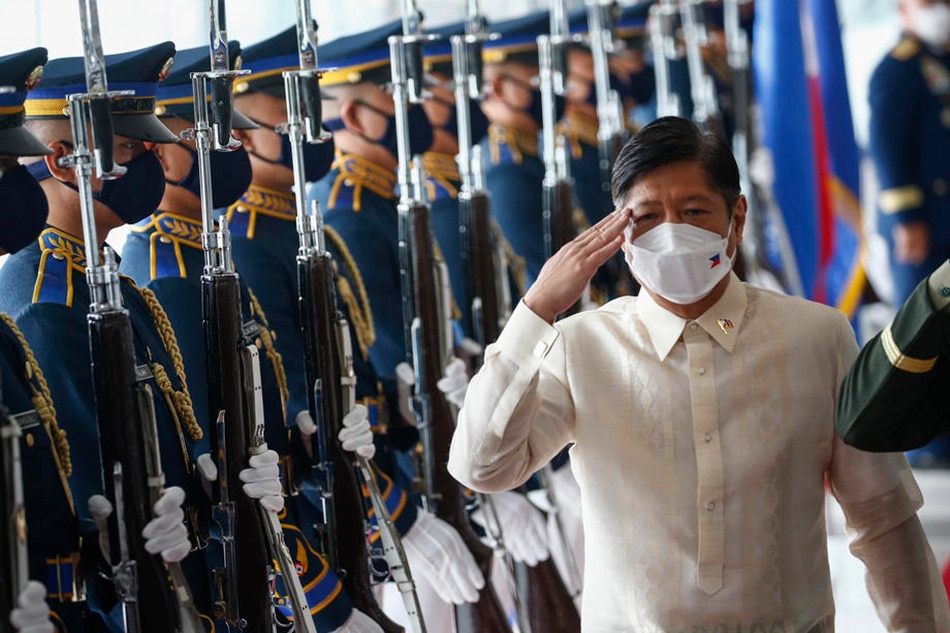Marcos explores Indonesia-PH maritime border template in dealing with China | ABS-CBN
ADVERTISEMENT

Welcome, Kapamilya! We use cookies to improve your browsing experience. Continuing to use this site means you agree to our use of cookies. Tell me more!
Marcos explores Indonesia-PH maritime border template in dealing with China
Marcos explores Indonesia-PH maritime border template in dealing with China
Katrina Domingo,
ABS-CBN News
Published Sep 06, 2022 11:03 AM PHT
JAKARTA - President Ferdinand Marcos Jr. on Tuesday said he is open to “explore” maritime border talks with China using the collaborative strategy that led to a peaceful settlement between overlapping claims in the Mindanao and Celebes seas.
JAKARTA - President Ferdinand Marcos Jr. on Tuesday said he is open to “explore” maritime border talks with China using the collaborative strategy that led to a peaceful settlement between overlapping claims in the Mindanao and Celebes seas.
Marcos underscored that the Philippines and Indonesia successfully settled overlapping exclusive economic zones in the Mindanao and Celebes seas through years of dialogue and collaboration.
Marcos underscored that the Philippines and Indonesia successfully settled overlapping exclusive economic zones in the Mindanao and Celebes seas through years of dialogue and collaboration.
“We should show it to the rest of ASEAN (Association of Southeast Asian Nations) as an example that it can be done basta maguusap kayo,” Marcos told reporters in a press conference here.
“We should show it to the rest of ASEAN (Association of Southeast Asian Nations) as an example that it can be done basta maguusap kayo,” Marcos told reporters in a press conference here.
When asked if he is keen on using the same strategy to settle the Philippines’ maritime row with China, Marcos said: “It is worthwhile to explore at the very least.”
When asked if he is keen on using the same strategy to settle the Philippines’ maritime row with China, Marcos said: “It is worthwhile to explore at the very least.”
ADVERTISEMENT
“We came to a conclusion and a resolution. So we should try,” he said.
“We came to a conclusion and a resolution. So we should try,” he said.
In 1994, the Philippines and Indonesia worked together in mapping how the two countries should divide its overlapping claims in 2 strategic waterways.
In 1994, the Philippines and Indonesia worked together in mapping how the two countries should divide its overlapping claims in 2 strategic waterways.
After 20 years of talks, the 2 Southeast Asian countries signed the Philippines-Indonesia maritime border agreement, a landmark deal hailed by the international community as a model for peaceful settling of international disputes.
After 20 years of talks, the 2 Southeast Asian countries signed the Philippines-Indonesia maritime border agreement, a landmark deal hailed by the international community as a model for peaceful settling of international disputes.
In 2019, the agreement entered into the force of law during the sidelines of the 52nd ASEAN Foreign Ministers meeting in Thailand.
In 2019, the agreement entered into the force of law during the sidelines of the 52nd ASEAN Foreign Ministers meeting in Thailand.
Marcos said he plans to use the same strategy in the delimitation of the continental shelf between Indonesia and the Philippines.
Marcos said he plans to use the same strategy in the delimitation of the continental shelf between Indonesia and the Philippines.
ADVERTISEMENT
“The one thing I was very interested in was the delimitation talks between Indonesia and the Philippines,” the Philippine President said.
“The one thing I was very interested in was the delimitation talks between Indonesia and the Philippines,” the Philippine President said.
“Sinasabi ko yan ang parang template sa delimitation talks sa continental shelf,” he said.
“Sinasabi ko yan ang parang template sa delimitation talks sa continental shelf,” he said.
“Puwede kong gamitin yan kapag iba, kahit na iba ang kausap,” he said.
“Puwede kong gamitin yan kapag iba, kahit na iba ang kausap,” he said.
The Philippines and Indonesia are among countries that have been speaking against Chinese incursions in parts of the South China Sea after Beijing claims that it owns the entire strategic waterway.
The Philippines and Indonesia are among countries that have been speaking against Chinese incursions in parts of the South China Sea after Beijing claims that it owns the entire strategic waterway.
In 2016, the Hague-based Permanent Court of Arbitration invalidated Beijing’s sweeping claims, saying its so-called 9-dash line had no basis.
In 2016, the Hague-based Permanent Court of Arbitration invalidated Beijing’s sweeping claims, saying its so-called 9-dash line had no basis.
ADVERTISEMENT
China refused to acknowledge the court’s ruling in favor of the Philippines, and continued fishing and reclaiming land in shoals within the exclusive economic zones of other countries.
China refused to acknowledge the court’s ruling in favor of the Philippines, and continued fishing and reclaiming land in shoals within the exclusive economic zones of other countries.
Manila has filed multiple diplomatic protests against Beijing, while Indonesian President Joko Widodo asserted Jakarta’s claim over the Natuna Islands by boarding a sea vessel that patrolled around the disputed maritime territory.
Manila has filed multiple diplomatic protests against Beijing, while Indonesian President Joko Widodo asserted Jakarta’s claim over the Natuna Islands by boarding a sea vessel that patrolled around the disputed maritime territory.
ADVERTISEMENT
ADVERTISEMENT



